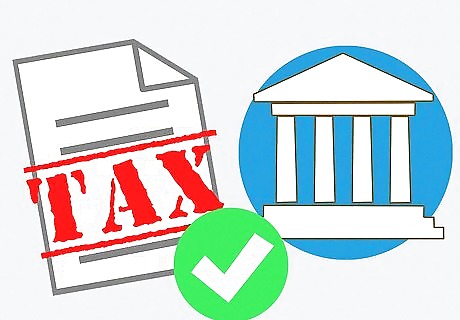
views
Planning Your Business

Research the market. Self-storage is a fast growing sector of small business and real estate, and it can be highly profitable if you get it right. In order to give yourself the best possible chance, it's essential that you gain a strong understanding of the sector before committing a lot of time, effort and money into getting your business off the ground. You need to have a clear picture of the local demand, the local competition and the kind of costs and profits you might be looking at. Start by searching online and through paper listings for self-storage businesses operating in your locality. Look at the prices they charge and the kind of capacity and service they can offer. An area with a lot of storage business suggests high demand, but also may be already well-catered for. According to one analysis, sites that are three or four years old, and are only 70 per cent occupied indicate a soft market that you should avoid. Trade journals and specialist websites are generally excellent sources of trade specific information.

Outline your goal. Once you have an idea about the local storage market, you should try to articulate what it is exactly that you want to create. Are you looking to create a small business that you can run part-time from home to supplement your income? Or are you interested in building a larger business that you will need to invest much more time and money into?

Determine your start-up costs. Before you go any further you need to draw up some figures for your estimated start-up costs. These are costs that you will have to pay to get the business off the ground, sometimes known as sunk costs. Start-up costs should be separate to your ongoing maintenance and business costs, and it's important that you are certain you can raise the finance first. Your start-up costs might include the initial rental costs for the storage facility or land you will be using, the costs of hosting a website, and the promotional material you will use to launch your business. This information will feed into your business plan.

Write your business plan. The business plan is the most crucial document for your business. It will contain all the detailed market research you have carried out, as well as all your projected costings, and plans for the future development of the business. If you plan on seeking financial support from an external source for your business, a clear, well-researched and credible business plan is absolutely fundamental. You can find examples of business plans for self-storage start-ups online. You plan should include the following sections: An executive summary detailing your objectives and the keys to success. A company summary outlining the nature, size, location and ownership structure of your business. A section on the services that your business will deliver. A market analysis summary. A clear outline of your marketing and implementation strategy for the business. A summary of the business's management structure and approach. A detailed financial plan with costings and projections to cover the first few years of business.

Map out your marketing strategy. A final essential element in your business planning, is developing a clear and comprehensive marketing strategy. There is no single way to market a business and you have to demonstrate flexibility and adaptability to find an approach that works for your business. At this early stage you should try to cover a few key areas in your marketing strategy: Market penetration: this means how you will enter the market and create a distinct space for your business. Communications strategy: this section deals with how you will reach your customers directly. This could include promotions, advertising, and printed materials like flyers. Growth strategy: this will cover your strategy for growing and expanding your business over time. This might include elements on securing more storage units, or employing staff.
Starting Your Business

Seek financial support. If you are starting a business from scratch it's likely that you will need to seek financial support to get it up and running, and cover the initial costs. In order to make a funding application to a financial institution you will need a clear business plan as well as detailed financial information. You will have to write up and be prepared on answer questions on: Your funding requirement and how much money you need. Any future funding requirements you may have for the next five years. How you will use the funding, giving precise information on capital expenses or other costs you intend to use it for. Any strategic financial plans for future, such as selling your business or paying off debt.

Secure your location and units. The essential part of a self-storage business is the actual premises where your customers will store their items. Obtaining secure space for storage in an area that is accessible should be your first major expense, and is something you should consider carefully. Look for somewhere that has a lot of traffic, and is properly zoned for business development. You can build your own storage units on land you have purchased and have the rights to use. There are companies that construct and deliver storage units in a variety of shapes and sizes that you can buy direct.

Ensure you comply and tax and legal regulations. As a small business you will need to make sure that you are properly registered and in compliance with all the relevant tax and legal regulations. You need to research both Federal Licenses and State Licences in order to proceed. An organisation, such as the US Small Business Administration, can give you valuable advice and guidance about how to navigate the red tape for a new business. You should hire an attorney who specialises in regulations and taxation for small businesses to ensure that everything is taken care of properly. Ask your attorney about the various grants and financial aid schemes that exist for small businesses to determine if you are eligible for financial support from the government.

Develop your online presence. An effective online presence is essential for the success of almost any business. For a self-storage company, your website presence is important but needn't be especially elaborate. The nature of the business means that potential customers will looking for a secure and convenient site, which is reasonably priced and easy to use. Don't limit your online presence to a smart website. Self-storage directories get a lot of traffic. When people search through these databases, you want your business to appear in the results. Using self-storage directories is a good way to make your company visible without getting to the top of ordinary search engine results.

Reach out to customers. Once you have a good online presence you need to take your marketing to the next level by actively reaching out to customers. You can do this in a number of ways, from mail-outs and flyers, to using social media to engage with people. With a business like self-storage, you can expect the majority of your inquiries and customers to come through listings and online self-storage databases. When you think about how to reach out to customers, you should also be thinking about how you respond to inquiries. Ensure whoever answers the phone has an excellent phone manner and is fully up-to-speed with all the pertinent information about the storage units. If a potential customer calls up, and the person who answers the phone cannot give an accurate price or indication of availability, you will not get many customers.

Consider expansion. When your business is up and running, you may consider expanding it. This might involve increasing the number of storage units and hiring staff. If you do decide to hire employees you need to follow all the specific legal and regulatory procedures. This will involve obtaining an Employer Identification Number, and setting up employer tax records. You will need to get all the relevant insurance and register new employees with your State. Talk to your attorney to ensure that all of the paperwork is completed correctly, and all of the taxes and regulations are met.


















Comments
0 comment